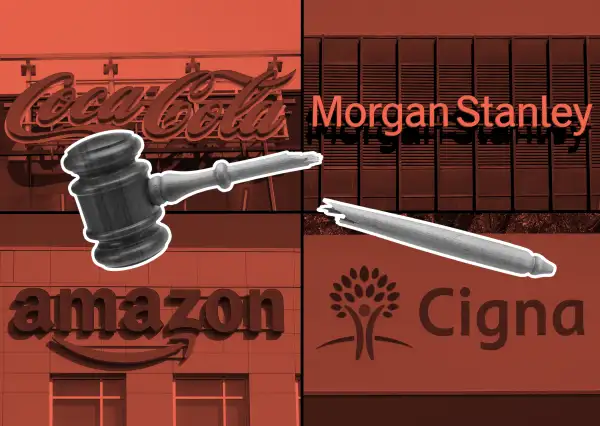Getting Screwed at Work? The Sneaky Way You May Have Given Up Your Right to Sue

Tens of millions of workers at companies that include Amazon, Ford, GE and and Coca-Cola have given up their right to take their employer to court, according to a pair of new reports—and may not even know that they've done so.
A new study finds that 80% of the country's 100 biggest companies use mandatory arbitration clauses in employment paperwork to force employees to use a private forum to settle potential disputes. That finding, released Tuesday by the Employee Rights Advocacy Institute for Law & Policy, means employees are forced to give up the judicial system for one that, opponents say, has an inherent bias against consumers.
The companies named in the report cover a wide range of sectors—from retailers Amazon and CVS to manufacturers (Ford Motors), energy (ExxonMobil) and finance (Morgan Stanley). In total, more than 12.9 million workers are work for companies that use forced arbitration clauses, according to employee data cited on the 2017 Fortune 500 ranking.
“If you’ve been injured by one of these employers, you cannot sue in court,” says the study’s author, Imre Szalai. This offers a disadvantage to employees, he adds, who have more tools at their disposal if they argue the case in court—including the ability to set up multiple depositions and make broad discovery requests. In arbitration, employers can control the parameters, with some opting for no discovery and only one deposition.
“If you have multiple co-workers involved in the wrongdoing, how can you even fairly prove your case if you only get to depose one co-worker?” Szalai says, calling arbitration a “slanted system.”
A similar report released Wednesday by the Economic Policy Institute suggests that these mandatory arbitration clauses are not merely the province of large employers. Across the board, arbitration clauses keep about 56% of non-union employees out of court, or roughly 60.1 million American workers, according to the EPI study, authored by Cornell professor Alexander J.S. Colvin.
These clauses apply to all workplace cases, both studies note—including major issues like sexual assault and harassment, as well as racial discrimination and other civil rights claims.
Many employees have no idea they've signed away their right to sue, Szalai says. Other arbitration studies have shown that people usually have no idea if they’re bound by such an agreement. For example, three out of four people surveyed by the Consumer Financial Protection Bureau did not know whether they had signed away their right to bring a lawsuit against a financial company. (As a follow up to that and other research, the CFPB recently issued a rule that would allow consumers to ban together to sue financial companies like banks and credit cards.)
Szalai found that, of the 80 Fortune 100 companies that use forced arbitration to cover workplace disputes, almost half also bar employees from banning together to file a case as a class. This is especially detrimental in cases where there are small damages—such as a wage dispute—and where bringing the case as a class action is the only feasible way for individuals to get justice without racking up high legal fees.
To determine which companies use arbitration agreements, Szalai dug through public court records going back to 2010. He found that 80 of the Fortune 100 companies—including subsidiaries or related affiliates—have challenged employment lawsuits, citing the existence of an arbitration provision. The study notes that there were 20 companies for which Szalai could not find any evidence of workplace arbitration contracts. Those include: Apple, McKesson, AmerisourceBergen, Cardinal Health, Walgreens, Boeing, Freddie Mac, MetLife, Archer Daniels Midland, United Technologies, Marathon Petroleum, Caterpillar, Liberty Mutual, MassMutual, TIAA, Tyson Foods, United, Publix, CHS and 3M.
The trend toward arbitration has exploded over the past 25 years. In 1992, a year after the Supreme Court essentially ruled that the Federal Arbitration Act could allow employers to settle workplace disputes through arbitration, about 2% of employers used this method, according to EPI's report. The number of American workers forced to use arbitration has more than doubled since the early 2000s.
"Working people have seen an increased attack on their rights and wages over the last few decades," Colvin said in a statement. "Now, more than ever, it is important for them to have access to the court system as a safety net for worker protections."
Companies that do bind employees to mandatory arbitration agreements typically do so through several methods. For executives, managers or those with a contract, the provision may be worked right into the employment agreement itself. Companies have also included mandatory arbitration agreements in their employee handbook, or paperwork that is handed to workers on the first day. Some even include these clauses in the employment application, Szalai says.
The study takes a broad view of the term employee—which Szalai contends is consistent with legal protocol. That includes everyone from a full-time, salaried employee to independent contractors and even staffing agency employees. For example, Dow Chemical and ExxonMobil are both on the list of companies that employ mandatory arbitration because they were involved in cases with maintenance workers who were hired by an outside staffing agency.
If you narrow the definition of an employee, eliminating affiliated workers, then at least half of the top 100 companies would still qualify as having mandatory arbitration provisions in place, Szalai says.
The issue recently reached the highest court in the land. The Supreme Court is set to hear a case next week that centers on the issue of employment arbitration—specifically, the legality of class action bans. The case hinges on whether arbitration agreements that require employees to waive their right to file as a class violate labor laws.
“If we only had one company in America doing this, then the cases are not as big of a deal,” says Szalai. “But if the largest companies in America are using arbitration for workplace disputes, then a lot is at stake.”